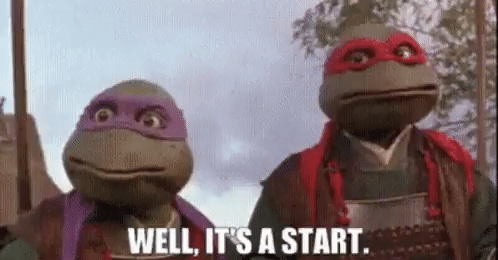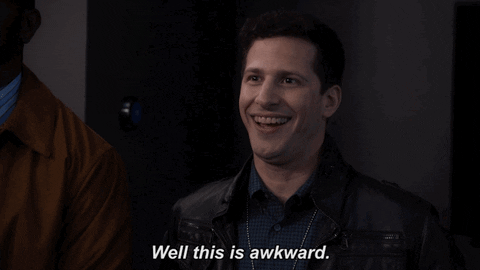#13: What's in a Title?
Calling yourself doctor, colouring chemistry and walking you through patient engagement from start to finish.
Found in Knowledge Translation Blog: The Doctor is In?
A regularly scheduled meeting, I logged into the conference call line and began quietly preparing my notes. As a staff member not part of the meeting proper, I was attending to provide insight into projects’ status as needed. Mid-discussion with a committee member, I didn’t want to interrupt the chair, and figured that they heard the telltale “beep” of someone signing on. They would ask who it was in due course.
On this particular day, the chair was feeling especially playful, I suppose, and greeted each new attendee to the call by their title - doctor. So when they asked if they missed anyone, I replied that “Dr. Robinson” was also on the call.
“…Who?”
- “Dr. Robinson.”
“…Oh! It’s Bryn.”
- “My apologies, I thought we were being formal today,” I said with a little laugh.
A few beats of silence, then the meeting opens.
Yeah, But Are You a Real Doctor?
Well, if the question is, “Can you prescribe drugs?”, then the answer is, “No.” This is a common enough question, but one’s response to it has become the prevailing criterion for judging “doctorness”. That is, the honorific “doctor” should be reserved for physicians because it is less confusing for patients. The Canadian Stylebook supports this position, noting the concern of potentially misleading patients by presenting your friendly neighbourhood epidemiologist as a doctor.
Now, some find this style choice problematic. After all, the origin of the word doctor is from the Latin verb docere, meaning “to teach”, and as purveyors of knowledge historically, those granted PhD were thus called doctors. In fact, Finnish universities double down on the meaning of the root word by having minted PhDs attend convocation with not just a top hat, but a sword:
The Doctor's Sword is a symbol for the scientist's fight for what he or she, in rigorous research, has found to be good, right and true.



That makes knowing a bunch of stuff far less nerdy, and far more metal, IMHO.
It was only in relatively recent history (~ 1700s) that medical schools began calling their graduates doctors. When it then became the inverse, such that the (grossly paternalistic) argument now is that “patients will be confused”1 if anyone non-medical is permitted to use the title, is uncertain (at least in my cursory research).
Fix Me a Coffee, Would Ya, Sweetheart?
Despite lacking both fancy hat and weapon of wisdom, I did get a PhD in 2010. And aside from creating an email account and Twitter handle, I rarely used it.2 But in the last two years, I have become more purposeful in wielding it when the case (in my mind) can be made. This was highlighted to me when, sitting with my morning coffee a few days ago, I logged into Twitter to find that my mentions a-bubbling:


The responses came in quick succession, with women in particular noting that they started putting it in their online profiles in response to continued misogyny, i.e., the lack of recognition for skill because they possessed different anatomy.
Did I mention the conference call earlier was all men except me?

There was a particular surge in similar Twitter profile revamps (mine included) following an odious opinion piece in the Wall Street Journal about Dr. Jill Biden, the First Lady and a holder of a doctorate in education.
I’d like to note at this point that OP’s take was not a misogynistic one, and we all had a positive and productive conversation in the ensuing thread.

I agree with him that there is a problem with people positioning themselves as experts in less than ethical ways. Indeed, some people abuse the power of expertise to their own personal gain. (You only need to look to New Jersey Florida Pennsylvania to see one glaring example of snake oil sales.)
Adding One Voice to the Choir
The issue of disrespect is not unique to women with PhDs; many female physicians have stories where they are assumed to be working in “traditional” healthcare roles associated with having a vagina (i.e., nurse, administrative assistant). Implicit in this assumption is that these “lady roles” are easier, of course, for our simple minds.3
Outside of a handle in the online world, I don’t usually advertise the fact that I am a masochist engaged in several years of intense academic development. I never really used to refer to myself as Dr. Robinson. People get my respect because of their character, not due to a few letters pre- or post-name, and I would hope that they do the same for me. After all, we all put on our pants the same way.
What I’ve learned over recent years, though, is that there are situations where it makes sense for me to use it a little more liberally, and, well, isn’t that the definition of privilege? My decision to use the title comes from a place where I can afford to brush off the odd ignorant comment because I have other pathways open to me as a middle-class, white, cis-gendered woman. It doesn’t make those comments acceptable, but it’s certainly not to the extent, nor with the frequency, that others receive similar comments.
So if adding my title online, or in a particular conversation, can contribute to changing the environment and maybe even helping people see more women as experts in STEM, well, I’m happy to do so.
#HowToDoPtEngagement
There’s a lot of great resources shared on Twitter for engaging patients in research, but it can be overwhelming to know where to start. Last week, I took a hypothetical researcher new to patient engagement through the planning of a research project, and identified key resources at different steps of the project.


It’s admittedly linear and sequential, where research can sometimes require several activities running in parallel, but it’s a start for those new to patient-oriented research (or those needing a refresher).
Regardless, I’d love to hear what you think, and if there are other threads I could compile with key resources. (I’m considering one on plain language next.)
Share Your Science
Who doesn’t want to colour the sun in sodium, or the sky in copper? With these chemistry labels for your crayons, you can educate while you tackle that next Doodle Art of magical unicorns. I don’t own these, but I love this example of a simple way to infuse some passive learning into every day play. The younger me would have loved this.
This notion that patients will be confused if PhDs - often employed in healthcare - are called doctor, is rather paternalistic in its assumption. Did anyone ask patients, or is it assumed they would be confused by this (and not the medical jargon all too frequently used, for example).
Not even on my Starbucks cup.
A clear indication that said person has never tried actual nursing, nor the delicate ballet of managing ego and five separate calendars seamlessly.









Great post, I'm glad you shared your POV on this topic. Doctor Robinson. :)